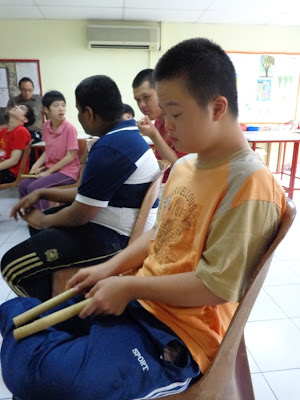Misconceptions about Down syndrome
I will be sharing three disabilities that are increasingly prevalent: cerebral palsy, autism disorders and Down syndrome from my experience as a volunteer at PKIK (read more).
XianJin followed me to PKIK during the school holidays in March. He's kinda 'stunned' to see the environment and disabled kids in the beginning. And pretty nervous like me too. He played some soothing music in the background while we're attending to the kids. Classical music does have a very calming effect. When he's more warmed up, he even helped to guide a student. He observed that during a task to hang clothes peg on a line, the student had arranged them in a repeated similar colour pattern. Like XianJin, many of us have some common misconceptions about people with learning disabilities.I think most people can pick out a person with Down syndrome. People with Down's have some characteristics that make them look like each other, eg eyes that are often almond-shaped and upward-slanted and flatter facial features. But, they're not all the same. There's much diversity within Down's like there's also diversity within typical people.
I am currently guiding Ken at the Day Training Programme. He is like a typical 14-year old who's curious and playful. He likes paper planes.
My experience is that people with Down's are wonderful, warm and have much potential for learning (but they can be stubborn too). Ken has attended some formal education at a primary school before joining the PKIK programme last month. Thus, he has a pretty good understanding of language, instructions, rules and schedules. It's been a joy guiding him at the centre.
There're many Down's people I met at PKIK who can live independently and able to speak clearly. Therefore, it came as a surprise to me to find out that Ken, who has so much potential, does not talk - not even a single word. Just because there's no speech, it doesn't mean that he cannot think or interact with us. He experiences the world in a different way and sees things very differently.
I've been observing him, but it's still too soon to say anything. But he does surprise me from time to time with the things that he can do. The reality is he can do a lot. It's just that our society has a different value or perspective of this difference. That's why we have labels of good or bad, normal or abnormal. We're all unique, that's why we do not act the same, speak the same or think the same. So, have you looked? With the right intervention, people with disabilities have special talents just like the rest of us.







Comments
Post a Comment